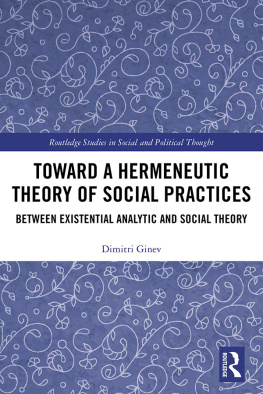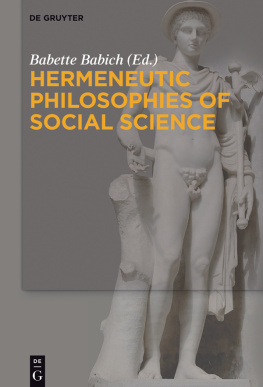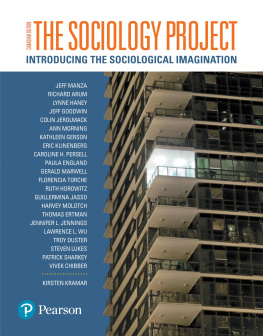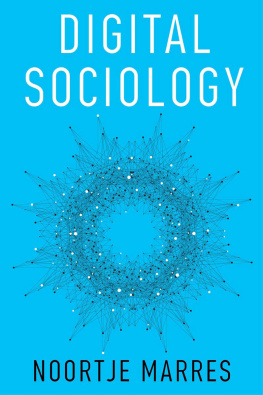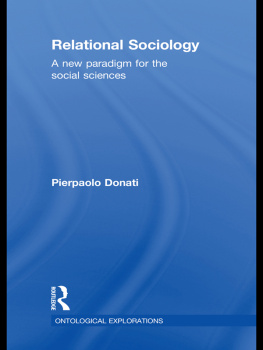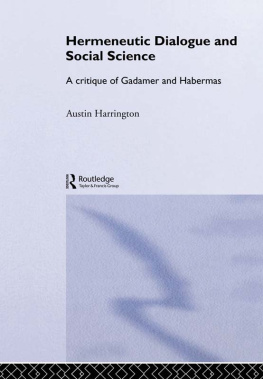ROUTLEDGE LIBRARY EDITIONS:
SOCIAL THEORY
Volume 29
THE HERMENEUTIC IMAGINATION
THE HERMENEUTIC IMAGINATION
Outline of a positive critique of scientism
and sociology
JOSEF BLEICHER
First published in 1982
This edition first published in 2015
by Routledge
2 Park Square, Milton Park, Abingdon, Oxon, OX14 4RN
and by Routledge
711 Third Avenue, New York, NY 10017
Routledge is an imprint of the Taylor & Francis Group, an informa business
1982 Josef Bleicher
All rights reserved. No part of this book may be reprinted or reproduced or utilised in any form or by any electronic, mechanical, or other means, now known or hereafter invented, including photocopying and recording, or in any information storage or retrieval system, without permission in writing from the publishers.
Trademark notice: Product or corporate names may be trademarks or registered trademarks, and are used only for identification and explanation without intent to infringe.
British Library Cataloguing in Publication Data
A catalogue record for this book is available from the British Library
ISBN: 978-0-415-72731-0 (Set)
eISBN: 978-1-315-76997-4 (Set)
ISBN: 978-1-138-79059-9 (Volume 29)
eISBN: 978-1-315-76361-3 (Volume 29)
Publishers Note
The publisher has gone to great lengths to ensure the quality of this reprint but points out that some imperfections in the original copies may be apparent.
Disclaimer
The publisher has made every effort to trace copyright holders and would welcome correspondence from those they have been unable to trace.
THE HERMENEUTIC
IMAGINATION
Outline of a positive critique of
scientism and sociology
Josef Bleicher
Routledge & Kegan Paul
London, Boston, Melbourne and Henley
First published in 1982
by Routledge & Kegan Paul Ltd
39 Store Street, London WC1E 7DD,
9 Park Street, Boston, Mass. 02108, USA,
296 Beaconsfield Parade, Middle Park,
Melbourne, 3206, Australia, and
Broadway House, Newtown Road,
Henley-on-Thames, Oxon RG9 1EN
Printed in the United States of America
Josef Bleicher 1982
No part of this book may be reproduced in
any form without permission from the
publisher, except for the quotation of brief
passages in criticism
Library of Congress Cataloging in Publication Data
Bleicher, Josef.
The hermeneutic imagination.
Revision of the authors thesis (Ph.D.)
Bibliography: p.
Includes index.
1. Sociology - Methodology. 2. Hermeneutics.
3. Positivism. I. Title.
HM24.B555 1982 301 82-7522
ISBN 0-7100-9256-3
ISBN 0-7100-9257-1 (pbk.)
To
Fiona
CONTENTS
In this book I have tried to apply some of the arguments developed in Contemporary Hermeneutics, in particular with reference to the subject-object relationship in the social sciences. The questions I asked myself were these: what is sociology? How is it possible? Why are there so many - conflicting - approaches to it? Can they be reconciled or interpreted in relation to their social context? What are the effects of a belief in the omnipotence of science on sociology and social practice? I can only hope the reader considers these questions relevant and finds my attempts at answering them at all enlightening.
The Hermeneutic Imagination represents a modified version of my PhD thesis. I am therefore pleased to be able to record my thanks here to Prof. Bauman who acted as my supervisor, and to Janet Wolff and Anthony Giddens from whom I received valuable advice. I am also indebted to students on my course in Sociological Theory on whom I tested out some of the ideas contained in this book and who responded in such an encouraging way. Dorothy Connor, who was one of them, also typed my thesis. Above all, I have to thank members of my family for the kindness and patience they have shown over the last few years.
This is one of the fundamental weaknesses - and perhaps also the fundamental greatness - of the human sciences: that all problems pertaining to mankind are ultimately problems for mankind. (Lvi-Strauss)
Never before has the fate of mankind been so precariously balanced. Its destiny seems intimately bound up with the questions of whether and how it can cope with accelerating scientific advance and channel its potential away from human self-destruction towards socially useful ends. The problems posed by science and technology had, therefore, best be seen as a challenge to the socio-cultural framework of society in the form of requiring us to understand their cultural significance and to create the social conditions in which their misuse - which seems to be programmed into our political order - can be avoided.
Such a task would necessitate learning processes in the sphere of the inter subjective determination of ends and purposes in line with the steady increase in instrumental knowledge. That the latter should have come to outstrip public control can be seen as symptomatic of the atrophy of the hermeneutic imagination which is being hastened by the encroachment of scientific rationality upon the communicative determination of a meaningful social existence.
It appears that sociology has, on the whole, not only failed to counteract this development, but has itself been instrumental in the demise of communicative rationality. It has largely failed to enlighten us about ourselves through widening our horizon to the point at which something qualitatively better, a more adequate way of organizing society, could have come into view. Instead it remained content with mirroring conditions in which individuals are fragmented both within and between themselves. I would argue that the tendency within sociology towards the gathering of instrumentally useful knowledge and away from the generation of practically relevant insight relates to the trained inability to take account of the hermeneutic dimension operative in the study of social phenomena and the reluctance on the part of sociologists to engage in hermeneutic (self-) reflection.
It is in this light that the following discussions should be seen. They take the form of a critique, i.e. an examination of the conditions of the possibility of sociology, in the hope of evidencing the social conditions, methodological and metascientific presuppositions suppositions, and practical implications of various approaches to it. I wish to argue that sociology contains a hermeneutic dimension which is both ineradicable and foundational. It is only on the basis of some pre-understanding that the study of social phenomena is possible; and since the latter are themselves meaningfully structured, the hermeneutic dimension in sociology takes the form of a double hermeneutic. I argue further that there exists an internal relationship between the mode in which the object is projected - i.e. whether and how its meaningfulness is conceived of - and the possible use of research findings. Such an examination is itself hermeneutic in that it locates sociologicial approaches within their context, thereby making transparent their social and historical preconditions and consequences.


